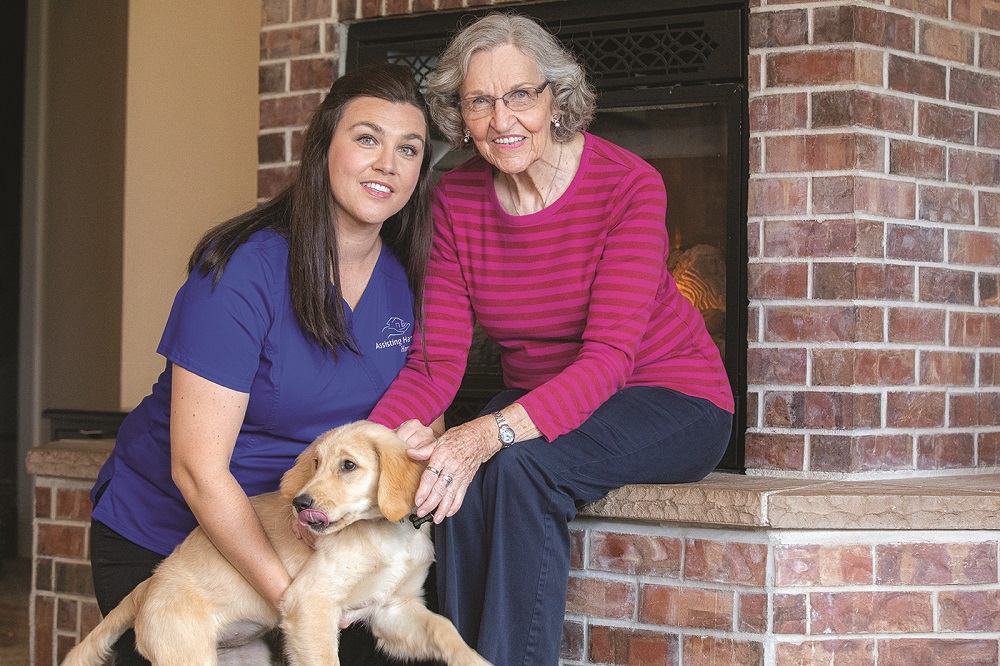
The majority of seniors prefer to age in place in retirement as the familiar setting of their home offers a sense of security not found in nursing homes or assisted living facilities. Being surrounded by family members, close friends, and treasured mementos gathered over a lifetime is the ideal way to live for many seniors.
While more seniors are preferring to age in place, some seniors are not opposed to moving into a nursing home. These facilities are staffed 24 hours a day, meaning seniors can get medical help any time with the touch of a button. Also, the large number of senior residents gives your senior loved ones plenty of opportunities to socialize with their peers.
The perks of a nursing home may be appealing to some seniors, but there will always be others who prefer to age in the privacy of their home. For cases in which those aging in place need consistent care and supervision, live-in care and 24-hour home care are viable solutions. With these services, a professional caregiver monitors the well-being of seniors in their home.
There are other factors you must consider when deciding between in-home care and nursing home care for your senior loved ones, including the level of care needed or desired, the cost of the care option, and the services you can expect from home care agencies and nursing homes. In this guide, we cover the main factors you must consider when deciding which is the best option for your senior loved ones.
1. Consider Social Factors
Seniors who live at home are often plagued by isolation and loneliness which can lead to mental health issues like depression. For seniors who struggle with loneliness, the companionship provided by an in-home caregiver is invaluable. Strong relationships may be developed between live-in caregivers and seniors in their care.
Live-in caregivers work in shifts, with a maximum of two caregivers tending to the care needs of the elderly individual each week. Given the limited number of caregivers, the senior gets to know these professionals and the familiarity and comfort can help foster a personal relationship that increases the senior’s emotional well-being.
Nursing homes also provide ample opportunities for seniors to socially connect. Nursing home staff organize afternoon group games, exercise sessions, and outings for its residents. Seniors who are more social will find the opportunities for socialization in a nursing home setting to be satisfying.
2. Evaluate Level of Care Required
Some seniors may require full-time care and support around the home. In such cases, a live-in caregiver is ideal. The professional caregiver will provide supervision and assist with activities of daily living (ADLs) such as medication reminders, help with personal care and grooming, and help with tasks around the home.
Seniors who require extensive medical care also have the option to remain at home. 24-hour care services include a team of caregivers who rotate shifts to ensure that there is always a caregiver awake in the home and ready to provide care and assistance. Two caregivers rotate 12-hour shifts daily, providing a continual level of medical care to the senior.
Ongoing medical care is also a prominent draw in nursing home facilities. When advanced medical care is required, immediate access to healthcare in nursing home settings becomes critical. Plus, staff assist with mobility issues, therapies, and all ADLs on a continual basis.
3. Assess Dementia Care Needs
One of the main advantages of in-home care is that even seniors with chronic conditions and dementia can receive skilled care. In-home dementia care providers are trained and experienced in responding to common symptoms of dementia, including wandering and outbursts of agitation. They can help stabilize moods and keep dementia patients calm with positive reinforcement.
Memory care facilities provide an optimal living situation for elderly individuals who live with Alzheimer’s disease or dementia. As dementia progresses, those affected will need a higher level of care. Advanced memory care services are an integral part of the care programs in certain nursing homes.
4. Assess the Safety of the Home
If your senior loved one is considering aging in place, it is important to assess the safety of their home. The home should be safe and accessible to accommodate their abilities. If your loved one has limited mobility or a risk of falling, you must take steps to minimize these risks to create a safe environment.
Seniors should have the following in their home to be able to age in place safely:
- Living room, bathroom, bedroom, kitchen, and other important areas on the first floor to avoid using stairs
- Flooring that can be navigated with canes, walkers, and wheelchairs
- Bright, motion-sensitive lighting to help those with vision loss or trouble seeing at night
- Organized cabinets and closets so seniors can reach the items they need without bending or using a stool or stepladder
- Securely fastened rugs with no wrinkles, ridges, or looped corners and edges
- Bathrooms that are accessible by walker or wheelchair
- Grab bars, shower seats, and hand-held faucets in the bathroom
- Wheelchair accessible ramps and secure railings in place of stairs at entrances to the home
A home care agency can also help you assess the safety of the home and take steps to improve the safety for your senior loved ones. If the home simply cannot be made safe enough for your loved ones to age in place, they may be more comfortable in a nursing home.
5. Consider Pets
If your senior loved one has a pet, they will likely not want to give their pet up to leave their home. Seniors form special bonds with their pets and for those who have chosen to age in place, a pet provides invaluable companionship. Seniors who have no serious medical needs, a safe home environment, and a pet can benefit from aging in place and receiving care and assistance from home caregivers.
If it is simply not possible for your loved ones to age in place and they have a pet, you must allow them to come to terms with giving up their pet before transitioning to a nursing home. You can make this transition easier by moving the pet to the home of a relative so your senior loved one can still visit their pet. You can also look into placing your loved one in a nursing home that has a resident pet or brings in pets from local shelters to spend time with the residents.
Live-In and 24-Hour Care from Assisting Hands

It has been shown that seniors who receive home care experience higher levels of happiness and an improved quality of life. Seniors who receive in-home care also tend to visit the doctor less each year. At Assisting Hands Home Care, we are committed to improving the quality of live of seniors who choose us for home care with our range of home care services.
As a reputable senior care provider, we offer comprehensive home care services to help seniors who have chosen to age in place. 24-hour in-home care and live-in care services are among our flexible home care services for seniors who need a caregiver available in their home every hour of the day. You can expect our caregivers to help your senior loved ones with all ADLs, including bathing and dressing, as well as additional activities like transportation, meal preparation, and light housekeeping. Your loved one will be in good company as our compassionate caregivers also make excellent companions.
Each caregiver from Assisting Hands Home Care is licensed, bonded, and insured so that families have maximum peace of mind. When the senior in your life would benefit from in-home support, look no further than the live-in or 24-hour care options from Assisting Hands Home Care. We serve families living in Medinah, IL | Glendale Heights, IL | Itasca, IL | Bensenville, IL | Elmhurst, IL | Villa Park, IL | Addison, IL | Lombard, IL and the surrounding areas of Northeast DuPage County with dedication.














